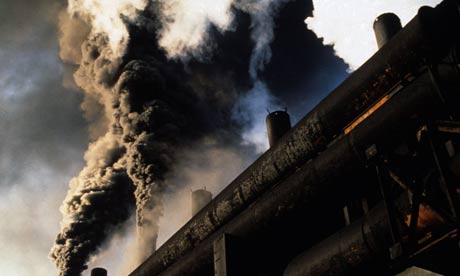· Coal and wood 'more damaging than thought'
· Black carbon harms environment and health

Smoke billowing from a plant in Copsa Mica, Romania. Photograph: Andrew Holbrooke/Corbis
Soot produced by burning coal, diesel, wood and dung causes significantly more damage to the environment than previously thought, according to research published today. So-called "black carbon" could cause up to 60% of the current warming effect of carbon dioxide, according to the US researchers, making it an important target for efforts to slow global warming.
Around 400,000 people are estimated to die each year due to inhaling soot particles, particularly because of indoor cooking on wood and dung stoves in developing countries. These deaths are mainly among women and children. Professor Greg Carmichael, of the University of Iowa, one of the authors of the study, published in Nature Geoscience, said: "Trying to develop strategies that really go after black carbon is really a very good short-term strategy and a win-win strategy for both climate and air pollution perspectives."
Carmichael and Professor V Ramanathan, at Scripps Institution of Oceanography in San Diego, put together data from satellites, aircraft and surface instruments on the warming effect from black carbon. They conclude that its effect in the atmosphere is around 0.9 watts per square metre, considerably higher than the estimate of between 0.2 and 0.4 watts in last year's report from the Intergovernmental Panel on Climate Change.
Most particulates in the atmosphere reduce the warming effect from greenhouse gases by bouncing radiation back into space - so-called global dimming. But black carbon has the opposite effect and Ramanathan and Carmichael argue that its contribution to global warming has been underestimated.
"The aerosols in aggregate are either acting to, you could say, cool the atmosphere or mask the effect of CO2," said Carmichael, "[Black carbon] is the only component of this aerosol mix that in and of itself is a heating element."
Previous estimates had not taken into account the fact that it has a larger impact at high altitude in the atmosphere and that it interacts with other particulates in the atmosphere. Scientists do not fully understand these interactions, but observations suggest that they result in more warming. The researchers said that programmes to replace wood-burning stoves with clean technology such as solar energy in developing countries such as India should be pursued to reduce the number of deaths caused by inhaling the smoke.
The authors stressed that these measures were not a magic bullet. "It is important to emphasise that black carbon reduction can only help delay and not prevent unprecedented climate changes due to CO2 emissions," they wrote.

No comments:
Post a Comment